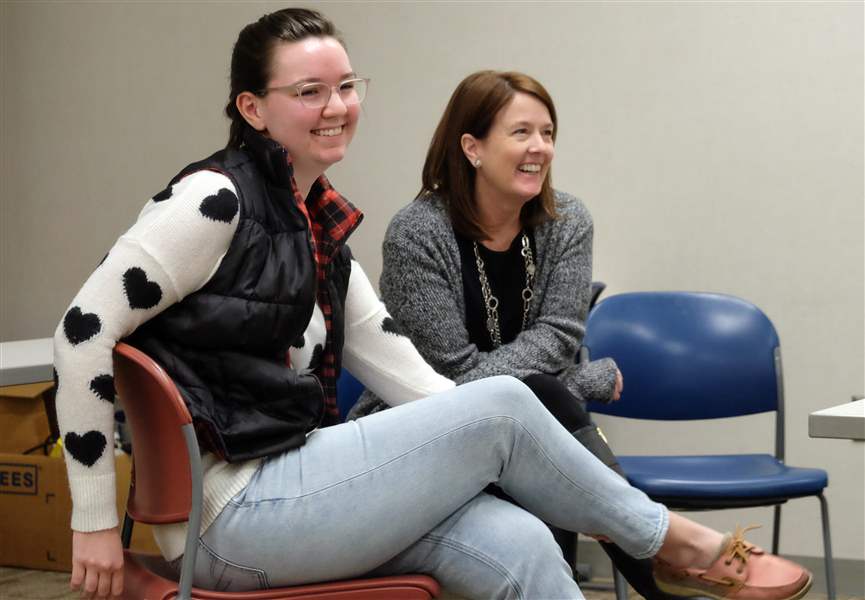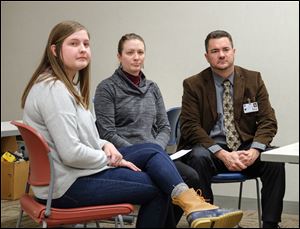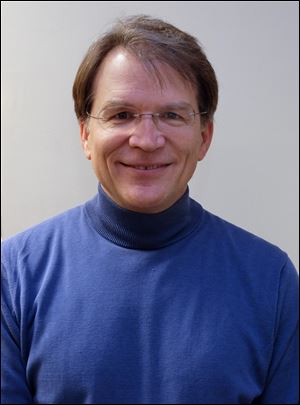
University of Toledo program trains organ donation coordinators
2/18/2018
Student Abigail Bond, left, and Tracy Kropp, Donor Family Services Coordinator for Life Connection of Ohio after a role play.
The Blade/Jetta Fraser
Buy This Image
Rachel and Jake Jones have traveled from California to Toledo after learning that their daughter, a college soccer star, was brain dead after a blow to the head during a soccer match.
Rachael Wulf, an organ and tissue donation coordinator, sits across from the couple at the hospital, comforting them but also letting them know that their daughter has requested to be an organ donor.
“Um, I want you to know that I’m here for you,” Ms. Wulf says. “I want you guys to know that your daughter has the rare opportunity to save up to eight lives.”

Student Rachael Wulf, left, listens to comments after completing a role play with Rachel Warnock, a graduate of the program now at Life Connection of Ohio, and Jake Judkins, program director, Human Donation Science program. Students in the transplant coordinator program at the University of Toledo role play with professionals in the field to learn how to interact with family members of potential donors.
Mr. and Mrs. Jones’ daughter is not dead, and Ms. Wulf is not yet an organ and tissue donation coordinator. The conversation with Ms. Wulf is a role-playing exercise for graduate students in the human donation science program inside the Collier Building on the Health Science Campus at the University of Toledo.
“Um ... you know ... you guys. You aren’t going to be perfect, but it’s OK to be silent. These words are silent fills. You always need to be professional,” said Missy Holliday, the organ operations director at LifeCenter in Cincinnati.
It is always uncomfortable to receive criticism, but Ms. Wulf seems to appreciate the advice. All the advisers — including Ms. Wulf — agree that she improved significantly from an exercise the previous day.
Ms. Holliday, one of the advisers, is in a role she never thought she would be playing when she was a pediatric critical care nurse. But her future changed when her sister, Dee-Dee, was killed in an automobile accident in 1991. In the emergency room, the family was asked dispassionately if they wanted to donate Dee-Dee’s organs.
“We were approached in a way that, thank God, doesn’t happen today,” Ms. Holliday said.
More than 100,000 Americans are waiting for potentially life-saving transplants. And there are only about 17,000 transplants a year, highlighting the need for viable organs. About 7,000 people died in 2016 while waiting for a transplant. The organs can sometimes come from live donors, but often they are procured from victims of deadly accidents after hard conversations with family members on the worst day of their lives.
“We would not have organ transplants if we did not have procurement coordinators,” says Dr. Michael Rees, a transplant surgeon and the medical director of UT’s Human Donation Science program.

Dr. Michael Rees, M.D., PhD.
Groundbreaking effort
On a snowy day in February, 2003, Michael Phillips met with officials of the University of Toledo Medical Center, the former Medical College of Ohio, about beginning a graduate program to train students to become organ donation coordinators.
Mr. Phillips, the retired former CEO of Life Connection of Ohio, has worked in the organ procurement field since 1971. While at the University of Alabama at Birmingham, a colleague of Mr. Phillips’ wrote a paper, detailing the high turnover among those procuring organs. At the time, the work was being done mostly by nurses without any specialized training. According to the paper, 95 percent of those nurses were out of the field within 18 months, not willing to put in the long, stressful hours required in the job.
Mr. Phillips thought it made sense to train specialists. His UAB bosses did not agree.
“When I got to Toledo in 1998, the thought was still in my head. The turnover was still high all over the country,” Mr. Phillips recalls.
On that February day in 2003, Mr. Phillips convinced those who needed convincing that this program was needed at UT. By the fall of 2003, UT had created the only master’s degree program in the United States that trains students to become organ donation coordinators.
“A donor coordinator shows up at the hospital, helps the donor family understand the process. If the person is not already on the donor registry, the donor coordinator gives the family options,” says Jake Judkins, UT’s program director for human donation science. “The coordinator starts the process of allocating organs, coordinating surgical recovery, securing operating rooms, and getting everyone to the right place at the right time.”
It is a stressful job. A donor can contribute multiple organs, organs that are needed in several locations across the country. The coordinator can work for 24 hours or more straight, making sure that no errors are made in procuring and distributing those organs. Lives literally hang in the balance.
“I equate it to war in some ways. In war, there are periods of great boredom, punctuated by these intense periods of action,” Dr. Rees says.
At UT, the human donation science program has two tracks. The first is designed to provide entry-level professional preparation for those wanting to become an organ and tissue donation coordinator. UT has 104 alumni in the field, and five more will graduate this summer. Mr. Phillips says that more than 80 percent of UT graduates remain in the procurement field, a remarkable success rate that has validated his belief in the program.
The second track at UT is an online program for professionals already working for an organ procurement organization who want additional training. There are seven students taking that curriculum.
“It’s been awesome to learn about the field,” says Abigail Bond, who will graduate from the master’s program this summer. “It’s unique in that it deals with all aspects of health care — patients, families, doctors, hospitals. It truly is someone who coordinates.”
A hard job
The morning of role-playing exercises inside the Collier Building highlights the complex job of donor coordinators. At one point, a coordinator is asked to track down a priest to discuss the religious implications of donating organs. In another exercise, a distraught mother is reassured that the coordinator will talk to police to determine if charges will be brought against a driver who struck and killed her son, who was riding a motorcycle.
More than anything, procuring organs is physically and emotionally stressful.
“My job is hard. I am taking organs out of dead people. I don’t like that part of the job,” Dr. Rees says. “But I get to cross that boundary — I have that dead person, but then I am helping to bring life to someone else. I get to do the good stuff. [The coordinators] are stuck with the bad. They don’t get to see the happy parts.”
And the master’s coursework is not easy. UT looks for classes of 10 students, but this class only has five. Entry requires a 3.0 grade-point average in undergraduate work, which must include at least two semesters of coursework in biological sciences, two semesters in chemistry, and some math. It also requires a person who can deal with the weighty emotional issues that come with the job.
“A coordinator has to be someone who can handle the long hours. They will sometimes have to work 24 hours. They need to be able to handle grief and loss,” Mr. Judkins says. “We need someone who is inspired to save lives when they go to work every day.”
Contact Brian Dugger at bdugger@theblade.com or on Twitter @DuggerBlade.